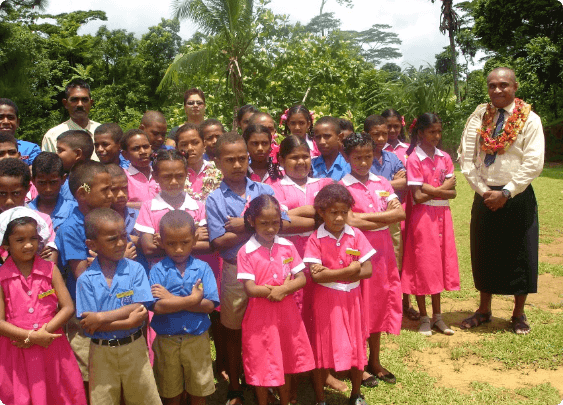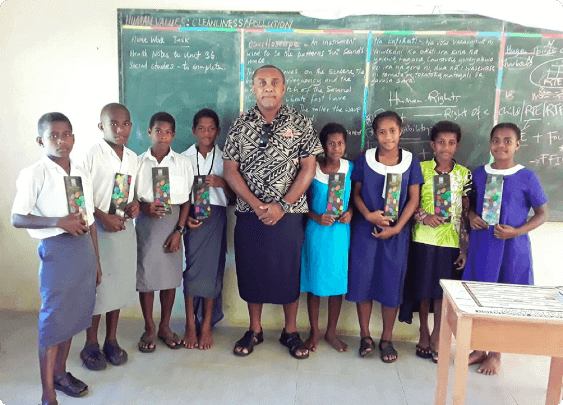- Accessibility:
- Text Size
Human Rights Education & advocacy
- Home
- Human Rights Education & advocacy
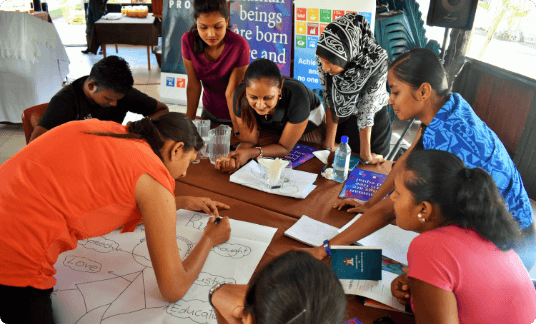
Human rights education is integral in materialising the Commission’s constitutional mandate on promoting the protection and observance of, and respect for human rights in the country.
The Commission through its education and advocacy team aims to reach out to all people living in Fiji, informing and educating them about human rights, in particular about the rights and freedoms enshrined in the Constitution of the Republic of Fiji and how they can claim those rights by seeking redress for violation of their rights. The Commission’s human rights advocacy is focussed on “rights and responsibilities”.
The Commission through its education and advocacy team aims to reach out to all people living in Fiji, informing and educating them about human rights, in particular about the rights and freedoms enshrined in the Constitution of the Republic of Fiji and how they can claim those rights by seeking redress for violation of their rights. The Commission’s human rights advocacy is focussed on “rights and responsibilities”.
The Commission has constructively engaged with diverse civil society organisations for discussions on significant issues relating to rights of arrested and detained person, bullying in school and use of corporal punishment bordering on violation of rights of children, cruel and degrading treatment experienced at home, in public places because of one’s gender identity, domestic violence, discrimination in the health sector with LGBTQ persons disallowed from donating blood, discrimination faced by persons living with disabilities when accessing public transportation and violation of environmental rights.
The Commission also raises awareness in the rural-remote communities through the Rights, Empowerment and Cohesion (REACH) for Rural and Urban Fijians initiative with its development partner, UNDP and stakeholders including Ministry of Women, Children & Poverty Alleviation, the Legal Aid Commission and the Fiji Police Force.
Our education/advocacy team has travelled to maritime, rural and remote areas, informal settlements, semi-urban and urban areas, creating awareness on key human rights issues.
Our education/advocacy team has travelled to maritime, rural and remote areas, informal settlements, semi-urban and urban areas, creating awareness on key human rights issues.
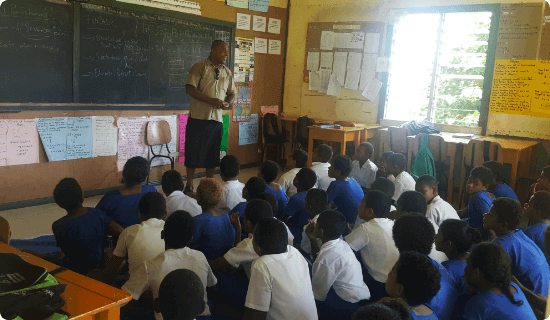
The Education and Advocacy team uses the following modes to raise awareness:
- School visitations
- Community visitation
- Working with CSOs, NGOs, Government agencies, community leaders, youth, women’s organisations and with our development partners to raise human rights awareness through workshops, training, forums, and public consultations.
- Mainstream media (media campaigns, press statements, radio and TV interviews)
- Digital awareness campaigns
- Educational resource material
- Use of vernacular languages to impart messages
- Advocacy through public interventions
- Radio/TV commercials or print advertisements on critical human rights issues
Advocacy Work
The Commission continues to create awareness on the need to harmonize national laws and practices to international standards. This is reflected in the work carried out by the Commission. For instance:
- Anti-racism campaigns
- “Say No to Racism”- The Commission was part of the (Unity Unplugged) Concert organised by Citizens’ Constitutional Forum to mark the International Convention on the Elimination of All Forms of Racial Discrimination
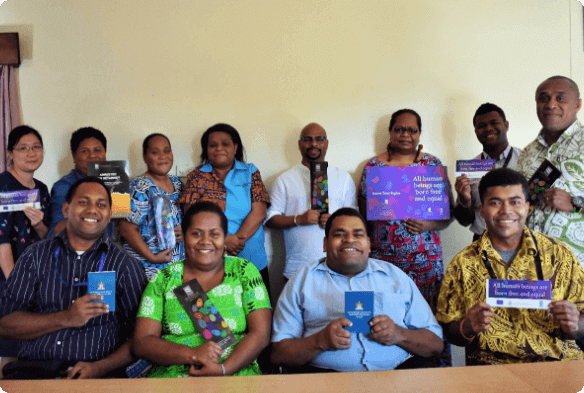
- “Stand up to racism”- Responded to an opinion by the leader of Unity Fiji, Savenaca Narube published in the Fiji Sun titled “Embracing Our Ethnic Fears”. The response was titled: Why We Must Speak out against Racism and Bigotry.
- Hate speech- A newspaper advert was put out in both national dailies (The Fiji Times and Fiji Sun) and on radio (CFL and FBC) in the context of the 2018 General Elections, urging Fijians to report incidences of violence including racial and religious attacks either on the social media.
- Hate speech on social media platforms – The Commission appeared on a talkback show called Speak Your Mind show on Gold FM, Radio Fiji on the subject: Why the Need to Regulate Social Media
- Racial profiling and stereotyping - The Commission has issued press statements on racial profiling and stereotyping expressing concern that various private and public institutions, through their representative bodies, continued profiling along racial lines.
- The Commission has appeared on FBC’s live radio show and television programme, Speak Your Mind to address issues of race relations and racism in Fiji and the significance of the International Convention on the Elimination of All Forms of Racial Discrimination.
- Other forms of discrimination on prohibited grounds
Other forms of discrimination on prohibited grounds
Launch of short video on violence and discrimination faced by LGBTI communities and promoting principles of non-discrimination; national consultation on LGBTI rights; condemnation of the preclusion of non-heteronormative subjects from donating blood;
The Commission has appeared on 4 The Record Show on FBC on religious tolerance in light of the Christchurch mosque shootings.
The Commission called for the ratification of the Convention on the rights of persons wth disabilities without reservation; issued a press statement in relation to the modification to the procedures set out in section 57 of the Electoral Act pertaining to voting by persons with disabilities.
The Commission has engaged with sex worker organisations such as Strumphet Alliance Network and Survival Advocacy Network on sensitizing the law enforcers on human rights and inherent human dignity of sex workers.
The Commission has called for greater compliance by the State with its obligations under the Refugee Convention following the deportation of an Iranian refugee.
Community and School Visitation
